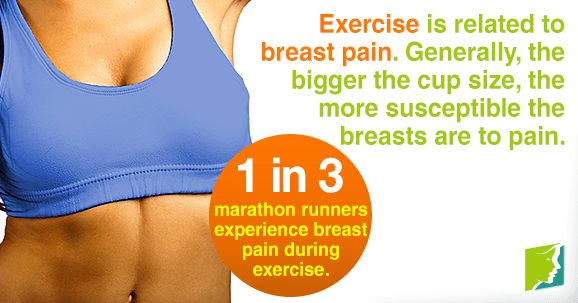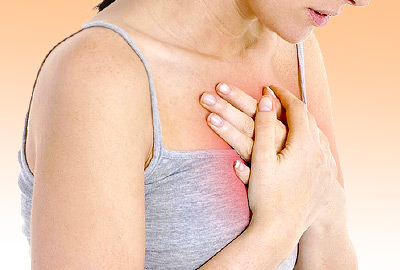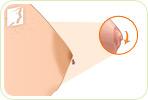Breast pain is common in both athletes and non-athletes. It is typically due to hormonal fluctuations, but can also be induced by physical activity. The British Journal of Sports Medicine recently published a study that examined the relation of breast pain to exercise in active women. Researchers surveyed 1,285 female runners at the 2012 London Marathon Registration. They asked the participants about their exercise habits, workout intensity, medical history, and how often they experienced breast pain. The study found that exercise is related to breast pain. This article will discuss research, causes, and prevention of breast pain caused by exercise.
Further Research
Previous research had found that unsupported female breasts - that is, when women do not wear a bra - move as much as eight inches (20 cm) in space when a woman runs. They not only moved up and down, but also side to side, forward, and backward. Scientists found that the participants' breasts continued to move significantly during running, even when they wore a sports bra. About one in three marathon runners experience breast pain during exercise. Generally, the bigger the cup size, the more susceptible to breast pain the woman is.
Remedies
It is recommended for women to wear a well-fitting, supportive bra during any kind of activity, which has been shown to lessen breast pain in about 85% of women. Any kind of activity and movement can cause breast pain, not just exercise, so it is helpful to provide proper support as often as possible.
- Get fitted. Proper bra sizing is crucial for providing maximum support and comfort. Getting fitted for the right bra is easy to do at most lingerie stores.
- Healthy diet. Diet plays a major role in overall health and breast comfort. Avoid excessive caffeine, as it is known to be a trigger of breast pain. Maintain a balanced diet with lots of fresh fruits and vegetables to help prevent breast pain.
- Exercise. Although it may seem counterproductive to continue exercising, it actually will help in the long run. Consider low-impact workouts like yoga, swimming, and walking to alleviate breast pain. Maintaining a healthy lifestyle and staying fit is crucial to a woman's well-being and quality of life.
If these treatment options do not work, consider talking to your doctor and scheduling exams to check for more serious health problems.
Breast pain affects almost all women at some point in their lives. Unfortunately, exercise affects breast tissue, and breast tenderness is more common in large-breasted women. However, there are several treatment options for this bothersome symptom. Getting properly fitted bras is crucial for obtaining maximum breast support and comfort. Maintaining a healthy diet and getting sufficient exercise are also vital to staying fit and preventing breast pain.
Sources
- Brown, N. et al. (2013). The experience of breast pain (mastalgia) in female runners of the 2012 London Marathon and its effect on exercise behaviour. British Journal of Sports Medicine, 48(4), 320-325. doi: 10.1136/bjsports-2013-092175
- Mason, B.R. , Page, K.A. & Fallon, K. (1999). An analysis of movement and discomfort of the female breast during exercise and the effects of breast support in three cases. Journal of science and medicine in sport, 2(2), 134-144. Retrieved from http://www.ncbi.nlm.nih.gov/pubmed/10476977




